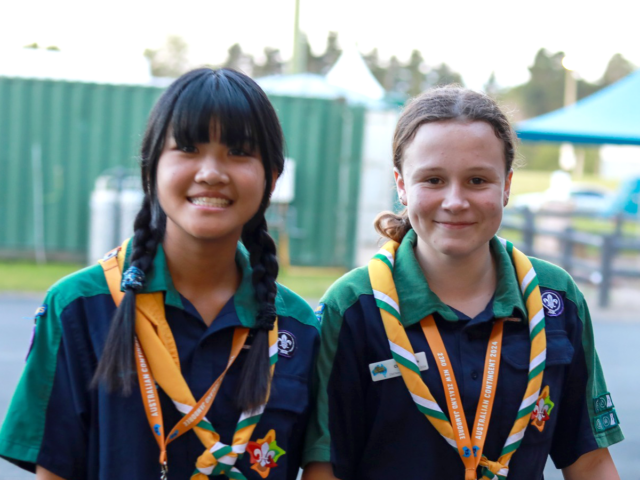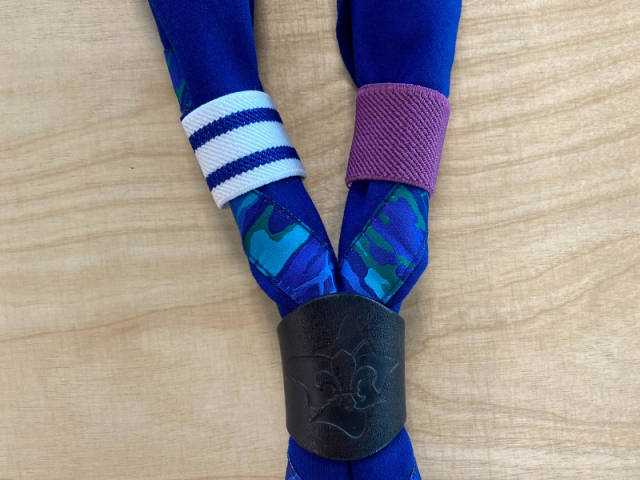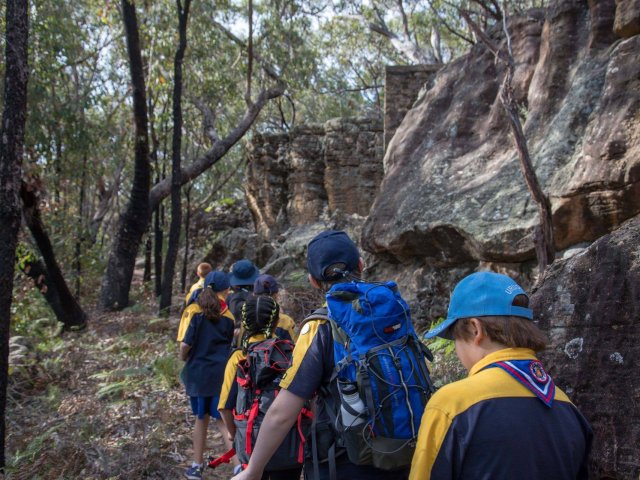Youth Program
When You Totally Get It Wrong: A Case Study on The New Program
![]()
Recently we sat down with Fiona Ryan, a South Australian Group Leader, to tell us what happens when you get it all wrong, and then be proud about how wrong you are!
Flinders Park Scout Group in the inner western suburbs of Adelaide started on their new program journey just when COVID-19 kicked in. Group Leader Fiona Ryan has been posting about the journey on social media, sharing with others the successes and challenges. For the most part, it has been an amazing adventure! We sat down with Fiona one Wednesday night to chat about their journey, and learn about her experience during the transition. We especially wanted to explore a bit more about one of her posts in particular.
“Sometimes it can seem a bit overwhelming trying to get our heads around this ‘new system’, especially if we have many years of experience in the old systems, but I was watching the Scouts Plan> their program last night, and they explained the books to a brand new kid, so that he knew what they were talking about. The visitor had a look through the books, and while they were planning, readily suggested ideas for the program that related to the skills that were listed in the book.
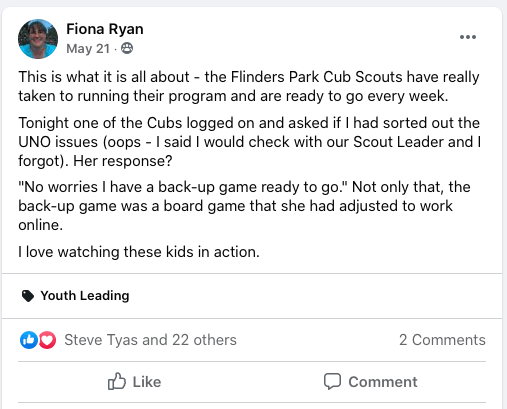
When you totally get it wrong…
“Last week we spoke about how it is a challenge for the adult Leaders to run around at the last minute looking for equipment and that we need to be better prepared. We reminded everyone who was doing what this week, but we did NOT send out a reminder email this week.
“Having not heard from ANYONE, I fully expected a learning experience tonight – what happens when we are not prepared…
“Guess who learnt a lesson? Yep, me! Not only did the Cub Scouts remember what they were doing, they came prepared with the equipment they needed, ran excellent activities AND debriefed them. This is after not even a term and a half running things! I have never been so proud to be so completely wrong! This is just so exciting!”
It got me thinking, clearly this ‘new’ system isn’t that hard if someone can pick it up that quickly, and maybe if we try to see it as is, without comparing to the other stuff we are familiar with, it might be a bit easier. Lots of exciting possibilities…
What passion and enthusiasm for our program! Was it really that good? During our visit, it was the Flinders Park Cub Scout’s Unit Council meeting. Three months ago it was a small Unit, but they have doubled in size during lockdown.
The previous week, program ideas had been brainstormed using the Challenge Areas. They had a heap of ideas for the next program cycle and a camp. The key issue for the Cub Scouts was the inequity of who got to assist and lead – everyone wanted to do it, even the new kids. It wasn’t fair!
Their thinking hats were on with heaps of collaboration, deliberation and compromise to evolve the program. The adult leaders provided some direction, asked clarifying questions and assisted with unpacking ideas. If there was an issue they went to a vote and the youth vote ruled.
“They have just started to fully embrace the new program. We have a program for every week, with different Cub Scouts leading an activity or game every night and adult leaders listed to support.
“They have checked that they have covered all elements of the program, and even added a Promise and Law section to every night as they noticed that was lacking.
“It was definitely challenging to get this organised online, but we battled through and I think this could be an amazing term! Oh, and, tonight’s first reflection from a Cub Scout… “I am grateful that we have finally got our program sorted”.
We chatted with Fiona about the growth she has seen in her youth members.
“The growth has been amazing. At the beginning of the year we had five young people running around, and not very focused. Now all of these young people are preparing activities, organising equipment and they are setting a great example for the other young people. They take time to listen when reviewing activities, they openly share what they found difficult in running an activity and listen to feedback from the other Cub Scouts about how they think the games and activities went.”
Fiona outlined the enthusiasm created by the program.
“I have believed in youth leading Scouting for a very long time. I am personally excited about how the program now encourages everyone to do Scouting this way. The program also gives the youth members so much more flexibility to choose the things that they would like to do. I think the kids are enthusiastic about Scouting because they are doing exactly what THEY want to do.
“The main thing is to actually give young people a chance to have a go, an opportunity to be successful (without ‘saving’ them) and an opportunity to make mistakes and learn from them (in a safe environment). When young people know they are safe and that they are listened to they will have a go at things.
“Last week was mayhem – with excited kids yelling at us from all directions and, I will admit it was very difficult to manage. We decided it was time to take action and proposed the proper use of the Patrol System. We asked our current invested Cub Scouts if they were prepared to commit to the roles of Patrol Leader and Assistant Patrol Leader, including attending regular Unit Councils. Happily, they were all keen to take up the challenge, so we started tonight with THREE Patrols!
“The difference was AMAZING! The Patrol Leaders and Assistant Patrol Leaders took their roles very seriously, setting an excellent example and helping out the new members. The Patrols started bonding, thinking of names/colours for their Patrol and taking on the challenges that had been set for this week.
“It was another exciting change to watch; these young people have come so far this year. And, after tonight’s amazing experience, it certainly goes to show that if you are using the Scout Method correctly you can save yourself a lot of heartache.
“Apparently, we have more friends coming along next week too!”
Fiona provided advice for groups about to start their new program journey.
“Trust the system. This is how Scouting began, with youth leading, adults supporting, and the new program formally gives young people the power to plan their own journey. Letting young people Plan> Do> and Review> their own meetings and activities gives them far more life experience than we can ever give them by taking over and running everything. AND, when it really gets going, there will be even less work for you to do as an adult Leader.”
How do the adult leaders support youth members to successfully assist and lead activities?
“All youth members know that they can contact the adult leaders via email or phone (via parents). Our main difficulty has been managing the preparation of equipment, and we haven’t really sorted that out completely yet. So, if a Cub Scout is planning a cooking night for example, they haven’t always communicated with us what they need, so have brought it along from home. Our main support comes in the form of managing the Unit and getting everyone quiet so that the Cub Scout leading the activity has a fair chance of running the activity successfully. Sometimes reminding people that we participate in all activities, as we would expect everyone to participate in something we were running and reminding them to be fair and listen when debriefing.
“After every activity we do a quick review of how it went. We usually begin with the person running the game. ‘Did it turn out how you expected? What would you do differently? What challenges did you have?’ We then throw the questions to the rest of the Unit. ‘Does anyone have anything to share with [the person running the game]?’ We try to make these constructive, and, I suppose we, as adult leaders, might interject occasionally to point out the good things about the activity if we find the youth members are being a bit too critical.
“I have found in all of our sections that even the most sensitive young person has been able to critically reflect on their activities, and as a result, the most valuable feedback is actually coming from themselves. They are all showing such a huge amount of personal growth.”
What impact has the program had on you?
“It is just so amazing to see these young people grow and show their true abilities. The excitement of seeing Scouting run how it is supposed to run is hard to explain though. It is really something that you need to experience. It is my hope that all adult leaders can experience this. As a Section Leader, I would see the role becoming easier over time as the youth members take more control.”
What are the strengths of the program?
“The strengths of our program are the patrol system, learning by doing, Challenge Areas, and personal progression. The personal progression aspect is even better with this program, as youth members can really focus on what interests them, rather than be pigeon-holed to particular badges. It also ensures that we can tailor challenges to individuals and cater for special needs.”
Can you imagine your Cub Scouts as Rover Scouts in the future?
“These people are going to make amazing Rover Scouts, and we have a Rover Scout Unit standing by to take them.”
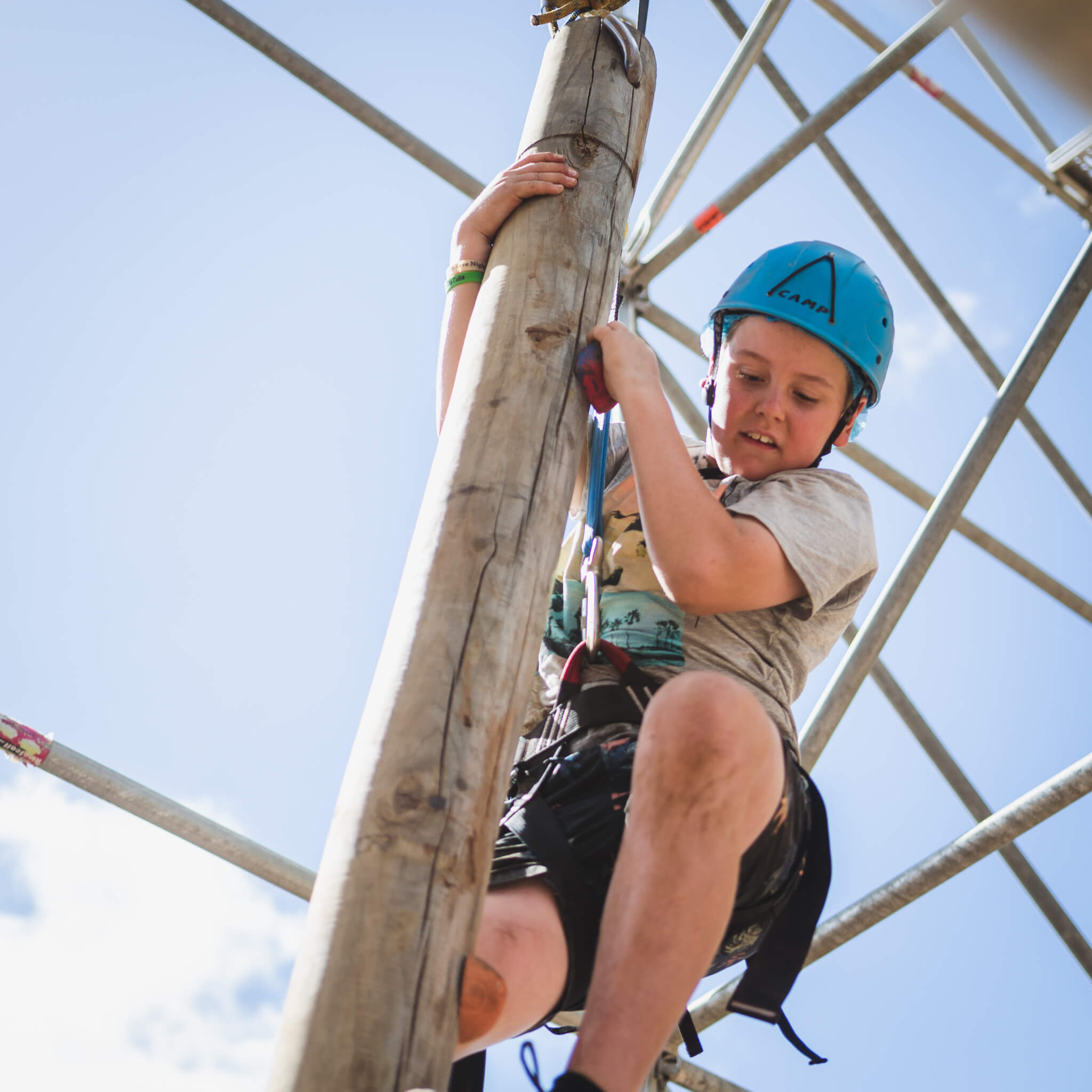
And a final comment…
“We are so lucky that we have adult leaders in our Group who are trusting the system and are giving the kids a go. And, the kids don’t disappoint – they are making a success out of the system, and if they ever do make a mistake, all we need to do is review it well and they will learn from the experience.”

